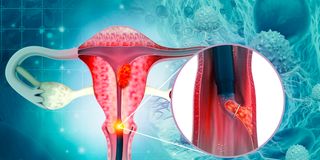New drug combination extends lives of endometrial cancer patients

Endometrial cancer is the most commonly diagnosed gynecologic and common form of uterine cancer.
What you need to know:
- According to Hopkins Medicine, endometrial cancer is the most commonly diagnosed gynecologic and common form of uterine cancer. Most cases of endometrial cancer occur between the ages of 60 and 70, but some may occur before age 40.
- Cancer strikes the endometrium, the lining of the uterus, when too much estrogen is produced. Women who do not ovulate regularly, such as those with polycystic ovary syndrome or hormone replacement therapy, are at greater risk.
Women with advanced endometrial cancer who receive immunotherapy and chemotherapy may live longer before their tumours return if they receive both treatments.
According to recent studies published in the New England Journal of Medicine, the addition of pembrolizumab (commonly known by its brand name, Keytruda) to the standard chemotherapy regimen of carboplatin and paclitaxel reduced the risk of advanced or recurrent endometrial cancer returning by up to 70 per cent, depending on the types of tumours.
Additionally, chemotherapy with a chemo-combination therapy that included a monoclonal antibody called dostarlimab reduced the risk of cancer returning by up to 61.4 per cent for up to two years after treatment.
According to Hopkins Medicine, endometrial cancer is the most commonly diagnosed gynecologic and common form of uterine cancer. Most cases of endometrial cancer occur between the ages of 60 and 70, but some may occur before age 40.
Cancer strikes the endometrium, the lining of the uterus, when too much estrogen is produced. Women who do not ovulate regularly, such as those with polycystic ovary syndrome or hormone replacement therapy, are at greater risk.
According to Dr David O'Malley, a gynecologic oncologist at the Ohio State University Comprehensive Cancer Center, the findings are expected to revolutionise how oncologists treat women in the later stages of cancer.
Immunotherapy is currently only approved as a second-line treatment for endometrial cancer, after chemotherapy. However, these results demonstrate that immunotherapy has a significant advantage as a primary treatment for cancers that have spread.
Dr Carol Aghajanian, a medical oncologist at Memorial Sloan Kettering Cancer Center in New York City who specialises in gynecologic cancers and the senior author of one of the studies, stated that the results were excellent and that some patients who received combination treatment went more than a year before their condition worsened.
The effect was even more pronounced in women with mismatch repair-deficient tumors, a subtype of endometrial cancer. A year later, not enough women with this tumor type who received chemotherapy plus immunotherapy have experienced tumor progression to determine how long the benefits may last.
The effect was even more pronounced in women with mismatch repair-deficient tumors, a specific type of endometrial cancer. A year later, not enough women with this type of tumor who received chemotherapy plus immunotherapy have experienced tumor progression to determine the potential duration of the benefits.
Dr Pamela Soliman, a gynecologic oncologist at MD Anderson Cancer Center in Houston, referred to the findings as "exciting" and stated that patients with advanced or recurrent endometrial cancer have limited treatment options. She added that the studies have implications for practice.
However, the Food and Drug Administration will need to revise its immunotherapy recommendations before it can be widely used to treat advanced endometrial cancer. Aghajanian stated that regulators are currently examining the new data.
Endometrial cancer is not routinely screened, and symptoms typically develop before it is detected. Postmenopausal bleeding and irregular vaginal bleeding are the most frequent symptoms.





